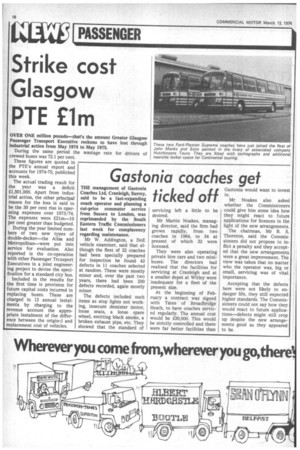Gastonia coaches get ticked off
Page 20

If you've noticed an error in this article please click here to report it so we can fix it.
THE management of Gastonia Coaches Ltd, Cranleigh, Surrey, said to be a fast-expanding coach operator and planning a cut-price commuter service from Sussex to London, was reprimanded by the South Eastern Traffic Commissioners last week for complacency regarding maintenance.
Mr W. Addington, a DoE vehicle examiner, said that although the fleet of 32 coaches had been specially prepared for inspection he found 42 defects in 11 coaches selected at random. These were mostly minor and, over the past two years, there had been 200 defects recorded, again mostly minor.
The defects included such items as stop lights not working, insecure demister motor, loose seats, a loose spare wheel, emitting black smoke, a broken exhaust pipe, etc. They showed that the standard of servicing left a little to be desired.
Mr Martin Noakes, managing director, said the firm had grown rapidly, from two coaches in 1964, to 34 at present of which 32 were licensed.
They were also operating private hire cars and two minibuses. The directors had realised that the facilities for servicing at Cranleigh and at a smaller depot at Witley were inadequate for a fleet of the present size.
At the beginning of February a contract was signed with Tates of Broadbridge Heath, to have coaches serviced regularly. The annual cost would be £30,000. This would be strictly controlled and there were far better facilities than Gastonia would want to invest in.
Mr Noakes also asked whether the Commissioners could give him some idea how they might react to future applications for licences in the light of the new arrangements.
The chairman, Mr R. S. Thornton, said the Commissioners did not propose to inflict a penalty and they accepted that the new arrangements were a great improvement. The view was taken that no matter who the operator was, big or small, servicing was of vital importance.
Accepting that the defects here were not likely to endanger life, they still expected higher standards. The Commissioners could not say how they would react to future applications—defects might still crop up despite the new arrangements good as they appeared to be.
















































































































